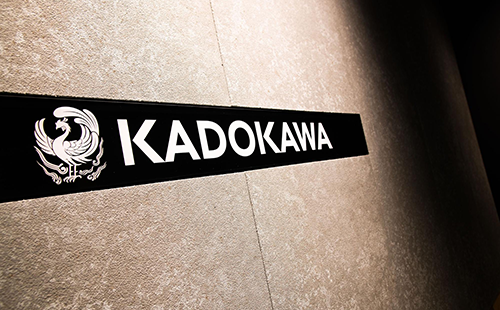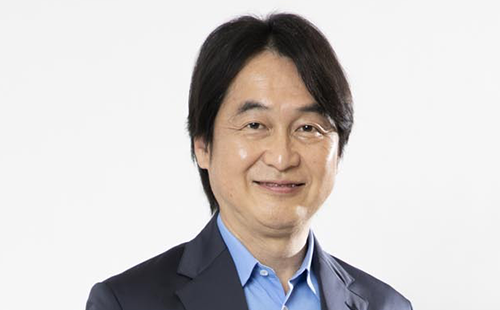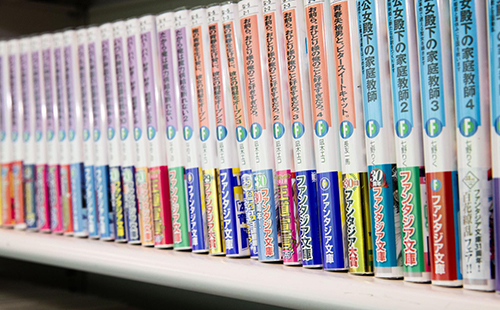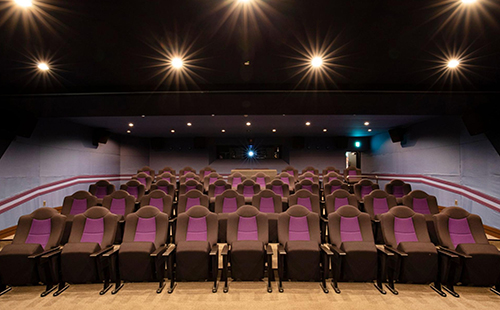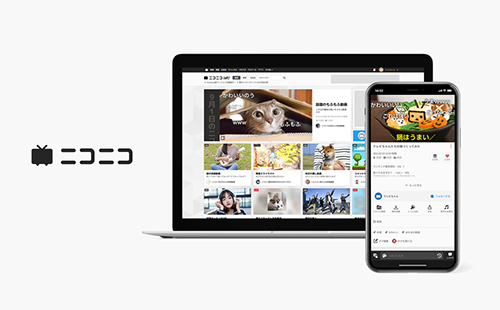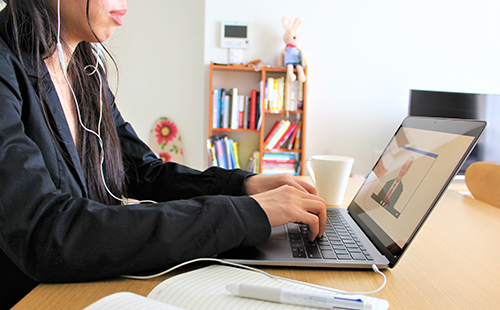3. Creation of a Pleasant Working Environment
Creation of a Pleasant Working Environment
The KADOKAWA Group observes local laws, regulations, and labor standards in the countries and regions in which we do business, and we respect the human rights of our employees. We also do not approve forced labor or child labor (*1). We believe that it is essential to our Group business activities to have an environment where workplace discrimination, bias, and harassment are prohibited, and where employees mutually recognize each other’s diverse personalities and can freely demonstrate their creativity.
The KADOKAWA Group is involved in a variety of initiatives to create an environment that is easier for employees to work in, with the establishment of fairness and appropriate work environment being a prerequisite.
We will remain committed to effective collaboration with many different stakeholders, such as employees, stockholders, business partners, customers, creditors and communities, and make it work to the benefit of employees. We also give consideration to business partners.
*1 Excluding duties where child labor is deemed necessary due to the nature of work (singers, child actors, etc.) within the scope of local laws and regulations.
- Driving Work Style Reforms
- System to Support Diverse Work Styles
- Occupational Safety & Health Management
- External Evaluation
Driving Work Style Reforms
KADOKAWA has introduced the "Workplace Choice" system to reinforce the company’s support for enabling employees to choose their workplaces at their own discretion and enjoy the benefits associated with their choice.
Since 2019, we have encouraged Activity Based Working (ABW) and pursued and achieved workstyles for employees to, in accordance with their jobs and lifestyles, choose themselves where to work, free from constraints of time and place. The establishment of an environment for telecommuting enabled us to adapt to the impact of COVID-19 at an early stage. On average, more than 70% of our workforce telecommute and telecommuting has taken root as one option available for employees.
Meanwhile, adapting our workstyles to the COVID pandemic led us to realize that the optimal workplace will differ depending on job, lifestyle and life stage. Some employees prefer the privacy and mental advantages of telecommuting. Others prefer working at an office to handle many different jobs more efficiently.
This led to the establishment of "Workplace Choice," a new system for each employee to choose his/her workplace from either "mainly office" or "mainly telecommuting" with the aim of respecting and supporting employees’ workstyles. The system was introduced in April 2023.
In line with the system, KADOKAWA helps employees work in a way that allows them to demonstrate their creativity. For example, all of our offices have been renovated in terms of layout and an environment has been built for employees to, whenever they go to the office, readily bring together coworkers and work efficiently as a team. In addition, employees who choose to mainly telecommute may receive financial support to build an environment for working at home.
Guest lounge, department meeting rooms and work desks in a KADOKAWA office
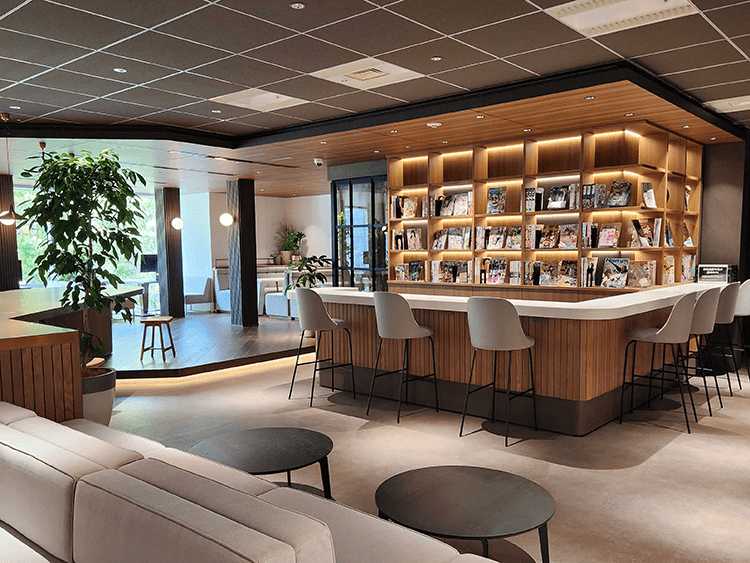
Guest lounge 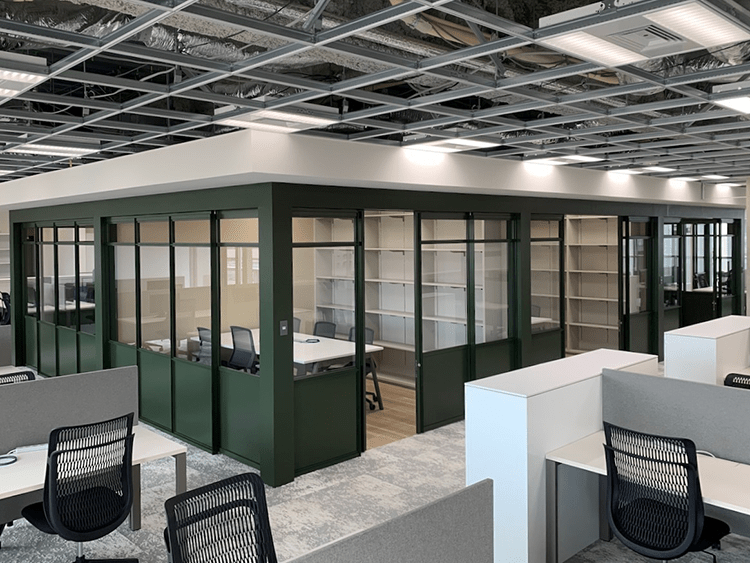
department meeting rooms 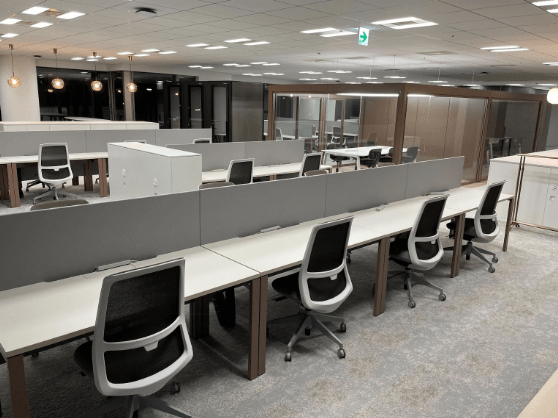
work desks
Establishment of a Remote Work Environment
We have strengthened various systems and supports to realize a comfortable work environment for remote work.
- [Examples of Systems and Supports]
-
- Grant to establish an at-home work environment
- Distribution of personal computers and iPhones
- Establishment of a VPN (Virtual Private Network) that can be used by all employees
- Introduction of proofreading tablets for editors
- Communication training
- Welfare subsidies are granted to social gatherings aimed at promoting ties among departments
- Introduction (*2) of communication tools suitable for remote work and thorough utilization support
-
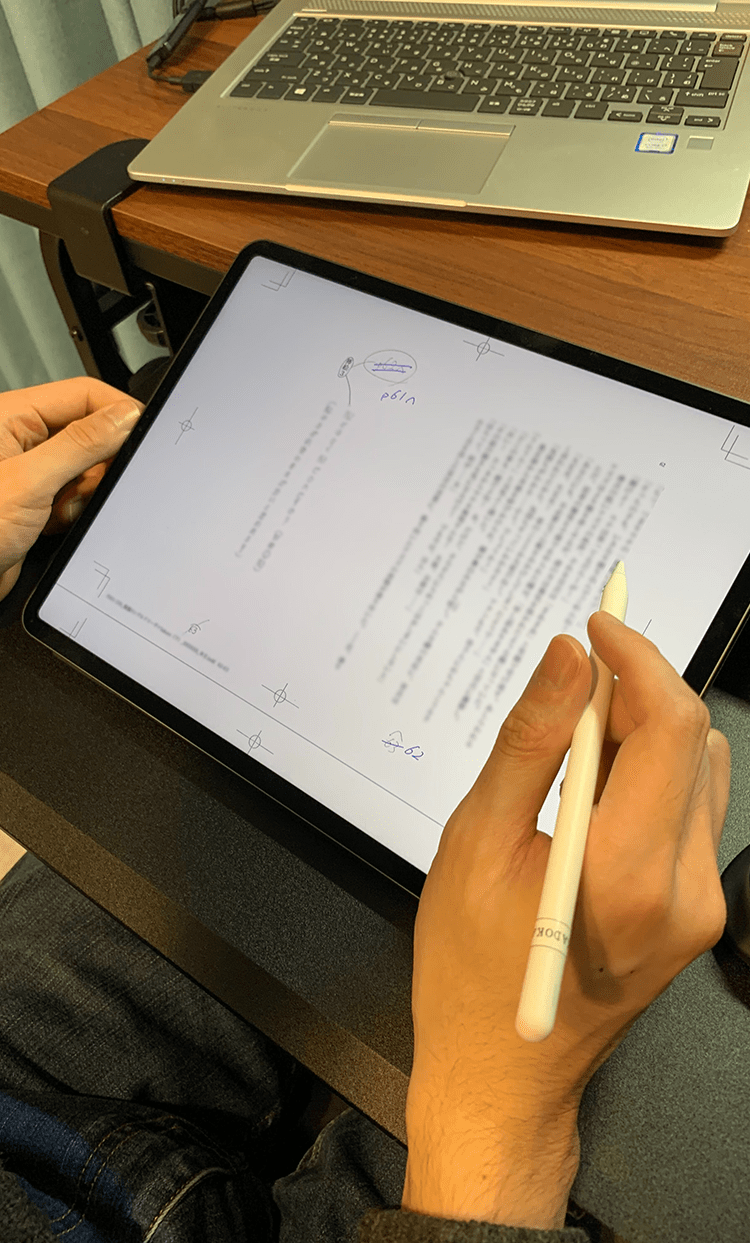
Proofreading tablet for editors -
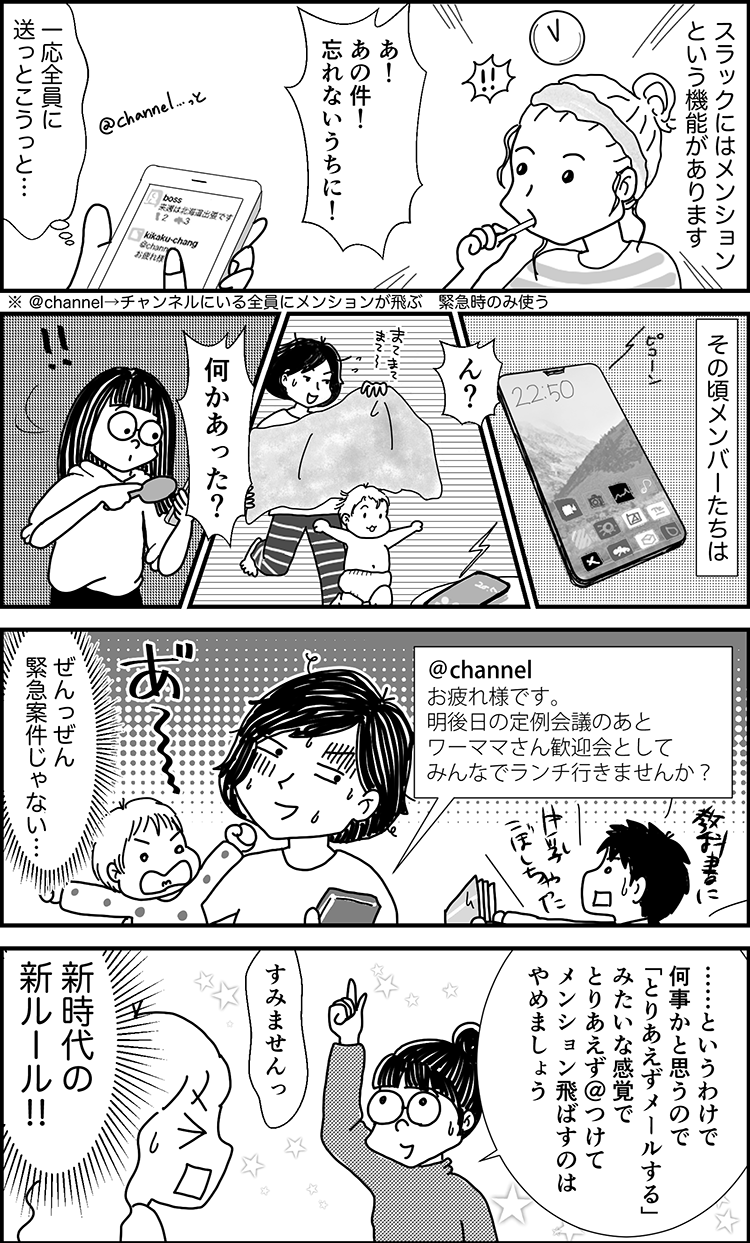
©Yoji Kikumoto, Motoko Watanabe, Minori Kambe
-

*2 Slack has been introduced to the KADOKAWA Group as a standard Group communication tool.
KADOKAWA Connected (*3), which promotes digital transformation across the entire KADOKAWA Group, was awarded the Japan Slack Spotlight Award, having been praised for its methods for spreading Slack with a four-column manga, entitled ICT Tsuuru Tettei Katsuyo Manga (“Manga for the Thorough Utilization of Information and Communication Technology Tools”).
*3 KADOKAWA Connected Inc. merged with DWANGO Co., Ltd. and BOOK WALKER Co.,Ltd. as of 1 April 2025.
System to Support Diverse Work Styles
KADOKAWA has established a working from home system, childcare systems, nursing care systems, and a variety of other benefit programs and leave systems to support the various working styles of employees. The Employee Survey is conducted to learn about employee satisfaction and their awareness of problems in terms of their motivation to work, the conditions within their organizations, communication with executives and other issues. The results of this survey are provided as feedback throughout KADOKAWA and used for purposes such as the review of internal policies.
Benefit Programs
We have introduced benefit programs centered around learning, supporting, and protecting, which also provides leisure time support.
Examples
- [Learning]
- [Supporting]
-
We offer a monetary gift corresponding to the number of children to support parents who are raising children and working at the same time.
We offer a monthly allowance to employees with children in the elementary school age or younger and before entering the junior high school.
We support the use of babysitter dispatch services for employees with children who are in their third year at elementary school or younger.
-
The allowance system supports employees who follow up the jobs of their colleagues on leave of absence, with the aim of enhancing the workplace culture of helping colleagues balance childcare/family care and work and developing a good environment where employees can easily take leave. Across the board, 20,000 yen per month is paid to an employee who followed up the job of a colleague who took maternity, childcare or family care leave for 28 or more consecutive days. The allowance continues throughout the period of leave.
[Timing of introduction] April 2025
- ●Childbirth Gift
- ●Nursery Allowance System
- ●Baby Sitter User Support
- ●Maternity, childcare and family care leave follow-up allowance
- [Protecting]
-
Employees are insured for a one-off payment of 1 million yen to be paid if they fall to one of the three major diseases (specified cancers, acute myocardial infarction, and stroke) without a co-payment burden (all insurance premiums are paid by the company).
40-year old employees or over are subsidized to a maximum 50 thousand yen to cover their co-payment for a checkup once every two years.
We have a compensation system for employees who are unable to work for an extended period due to illness or injury, so that they can feel secure while recuperating and go back to work early. Such employees can be guaranteed up to 80% of the standard monthly pay, if the optional insurance coverage is included, until they become 60.
- ●Collective Three Major Diseases Security Insurance
- ●Subsidization system for brain checkup (brain dock) expenses
- ●Group long-term disability (GLTD) insurance
- [Leisure and others]
-
We support the monthly fees of 3,000 yen for entertainment subscription services (services that allow users to use content for a certain period of time at a fixed price) that employees are enrolled in as a policy for supporting employees' creative ideas.
If an employee chooses to mainly telecommute, he or she may receive a Grant to establish an at-home work environment of 20,000 yen monthly.
We established the Employee Stockholding Association as one of our offered benefits, offering incentive pay for the purchase of stocks.
You may receive 4,000 yen per month if you use your personal smartphone on a BYOD (bring your own device) basis instead of using a company-provided smartphone.
- ●Subscription Allowance
- ●Grant to establish an at-home work environment
- ●Employee Stockholding Association
- ●Smart device choice subsidy
Leave System
We have introduced a leave system that each employee can utilize to meet their lifestyle, including for childcare and nursing care.
Examples
- ●Leave for Pregnancy, Birth, and Childcare
-
We have set up pregnancy leave, leave for doctor's visits, pre- and post-child birth leave, and childcare leave.
Childcare Leave Taken at KADOKAWA Group (April 1, 2024, to March 31, 2025)
Male Female KADOKAWA
(parent company
only)Eligible
employees38 23 Employees
taking leave14 25 Percentage of
employees taking
childcare leave36.8% 108.7% Rate of return from
childcare leave- 100% Turnover ratio after
taking childcare leave- 0% Domestic group
companiesEligible
employees109 57 Employees
taking leave52 63 Percentage of
employees taking
childcare leave47.7% 110.5% Rate of return from
childcare leave- 98.4% Turnover ratio after
taking childcare leave- 1.6% *The percentage of male employees taking childcare leave is the ratio of male employees whose spouses gave birth to the number of male employees who took childcare leave. The percentage of female employees taking childcare leave is the ratio of female employees who gave birth to the number of female employees who took childcare leave. The percentage may be greater than 100% because the year the child is born may be different from the year when childcare leave started.
- ●Family Care Leave
Employees caring for family members in need of care can take five to ten days leave annually depending on the number of family members in need of care. They can also work fewer hours and take nursing care leave.
- ●Childcare Leave for Sick or Injured Children
We offer five to ten days of leave annually depending on the number of children to employees with children up to the age of elementary school graduation.
- ●F leave
F leave can be taken if a female employee has much difficulty to work due to reasons such as menstruation and other health problems unique to women.
- ●Care support leave (Previous name: Volunteer Leave)
Up to five days of leave (accumulated leave must not be longer than 20 days) may be taken annually from the remaining expired annual paid leave. The goal is to support sick or injured employees that have been hospitalized, employees taking care of their elderly parents, employees engaging in volunteer activities and employees helping their sick or injured family members, visiting or staying in hospitals.
Employee Survey
KADOKAWA employees are asked to respond to a questionnaire survey regarding their degree of satisfaction and awareness of problems in terms of issues such as their motivation to work, conditions of their organizations and communication with executives. The results of the survey are provided as feedback throughout the Group via Slack and Group-wide gatherings and are used for purposes such as the identification of internal problems, the verification of the benefits of our systems and discussions of in-house measures. Additionally, we conduct questionnaire surveys on annual paid leave and work hours whenever appropriate.
In the Employee Satisfaction Survey conducted in January 2021, employee satisfaction was high on the whole and sense of burden was low compared to data from other companies. We implemented policies to further improve scores in some of the areas where scores were relatively low and areas that correlate highly with satisfaction regardless of scores.
The Employee Survey conducted in September 2024 indicated that employees positively evaluated the company in terms of direct communication with the president, creativity in their work, reasonable decision making as an organization and other matters. Problems are shared throughout KADOKAWA so that it can work on business management, institutional reform and other efforts we are engaged in.
Occupational Safety & Health Management
In addition to establishing a health committee and a long working hours prevention office to protect the health and safety of our employees, KADOKAWA also set up consultation and internal reporting hotlines.
[Establishment of a Health Committee]
A health committee, organized by industrial physicians and employees, meets once a month, conveys employee requests to the company with meeting minutes opened internally. The industrial physicians also visit workplaces on a regular basis.
[Prevention of Long Working Hours]
We work to prevent long working hours by observing laws and regulations related to work hours and overtime, by establishing a long working hours prevention office, and by monitoring and reminding employees about their work hours.
< Average overtime hours per employee in KADOKAWA (FY2020-2024) >
| FY2020 | FY2021 | FY2022 | FY2023 | FY2024 |
|---|---|---|---|---|
| 29.43 hours | 29.61 hours | 28.69 hours | 27.92 hours | 26.45 hours |
[Establishment of Consultation and Internal Reporting Hotlines]
In addition to the consultation hotline where employees can make consultations anonymously with their privacy protected, we also established the Compliance Hotline as a common internal reporting hotline for the entire KADOKAWA Group to appropriately process reports on compliance violations and more. Starting April 2022, we have also introduced an online health and medical consultation service for KADOKAWA employees in which they can consult with physicians about their physical conditions at any time.
Consultation and Internal Reporting Hotline Examples
●Private Consultations with Industrial Physicians and Public Health Nurses
●HELPO, a healthcare app. (operated by HEALTHCARE TECHNOLOGIES Corp.)
●24-hour Employee Consultation Hotline (External)
●Establishment of a whistleblowing office
[Initiatives on equal pay for equal work]
KADOKAWA is committed to improving its personnel system with consideration of the aim of “equal pay for equal work” in pursuit of fair treatment irrespective of differences in employment status. We try to support the choice of different workstyles so that employees can feel that they are being treated as they deserve irrespective of differences in employment status, such as full-time or part-time.
We will keep considering and improving fair treatment to accurately reflect employees’ working conditions.
Moreover, we have a system in place for employees to escalate and report opinions on working conditions and on the development of a good working environment through regular meetings between the management and the labor union (held monthly) and direct communication with the president.
External Evaluation
We have been highly rated from outside sources for our initiatives making work more pleasant for employees.
External Evaluation Examples
-
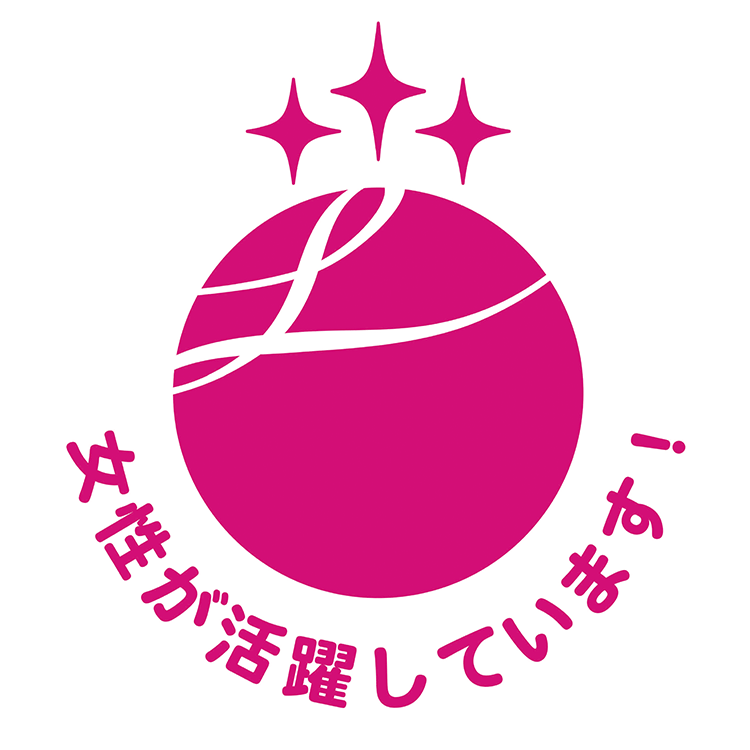
●“Eruboshi” Certification
The Ministry of Health, Labour and Welfare grants “Eruboshi” certifications to the companies with excellent commitment to women’s empowerment. It involves five criteria including (1) recruiting, (2) continued service, (3) workstyles such as work hours, (4) ratio of female managerial-level employees and (5) diversity in career paths, based on the perspective of whether the workplace makes it easy for women to demonstrate their capabilities in. A company’s Eruboshi level is decided in accordance with the number of Eruboshi criteria it satisfies. In September 2017, KADOKAWA reached Level 3, at which the company is deemed to satisfy all of the five criteria.
-
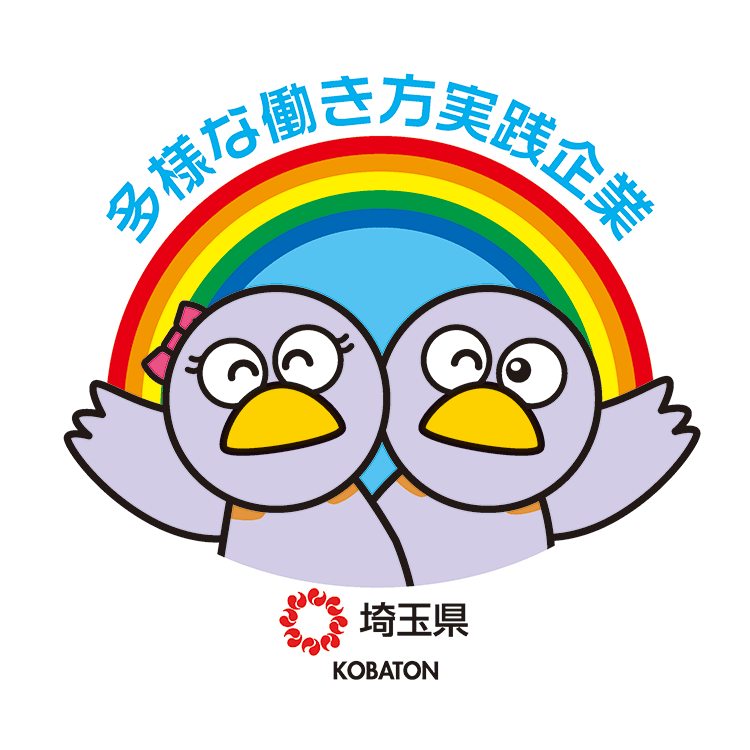
●Saitama Prefecture's Certification System for Companies Implementing Diverse Work Styles - Platinum Certification
KADOKAWA attained platinum level certification in August 2021, the highest rating in Saitama Prefecture’s Certification System for Companies Implementing Diverse Work Styles. This system certifies companies that are implementing remote working, reduced working hours, and other diverse working styles to support a good work-life balance.

